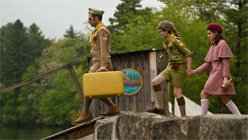In the first few minutes of Wes Anderson’s Moonrise Kingdom, the camera tracks horizontally and vertically along the cross-sectioned rooms of a house. It’s one of the writer-director’s signature visual tics, one that, like many of his techniques, announces his art as something artificial. Anderson isn’t breaking the fourth wall, he’s eliminating it, literally: all these rooms have only three, in order that we might glimpse the carefully choreographed ballet he has arranged for us inside.
That dance starts in the Bishop household, a family living on the fictitious New England island of New Penzance in the 1960s. (Anderson’s usual fetishization of that decade has finally led him to set a movie there.) The younger kids play on braided rugs, listening to Benjamin Britten’s “Young Person’s Guide to the Orchestra” on a toy record player, as mom and dad go about their evening routine. The eldest daughter, Suzy (Kara Hayward), obsessively scans the horizon with binoculars.
When the setting shifts, it’s to an encampment of “khaki scouts,” a troop under the command of the strict but earnest Scout Master Randy Ward (Edward Norton). He’s about to find that one of his young charges, 12-year-old Sam (Jared Gilman), has gone AWOL. Sam and Suzy, in the grips of young, on-the-verge-of-pubescence love, have plans to run away together.
Even once Anderson’s camera leaves the Bishops’ house for the camp, his shots retain the same tracking motions. The walls are gone entirely once in the outdoor camp, but the feeling that this is still a kind of dollhouse remains. And if a dollhouse can be the setting for endless hours of childhood storytelling, Moonrise Kingdom — and really almost any Anderson film — is that childhood toy blown up to life size, to tell stories played out by living, breathing human actors.
Yet even as dolls made flesh, they and their surroundings still retain the manufactured perfection of miniatures: Colors are too bright, too perfectly coordinated. Actors speak in self-aware deadpan, the adults with a stilted affectation, the children echoing the endearing amateurism of ’60s Peanuts specials. Anderson’s camera setups — the windows through which we see his world — are meticulously framed, with attention-grabbing unnatural symmetries.


